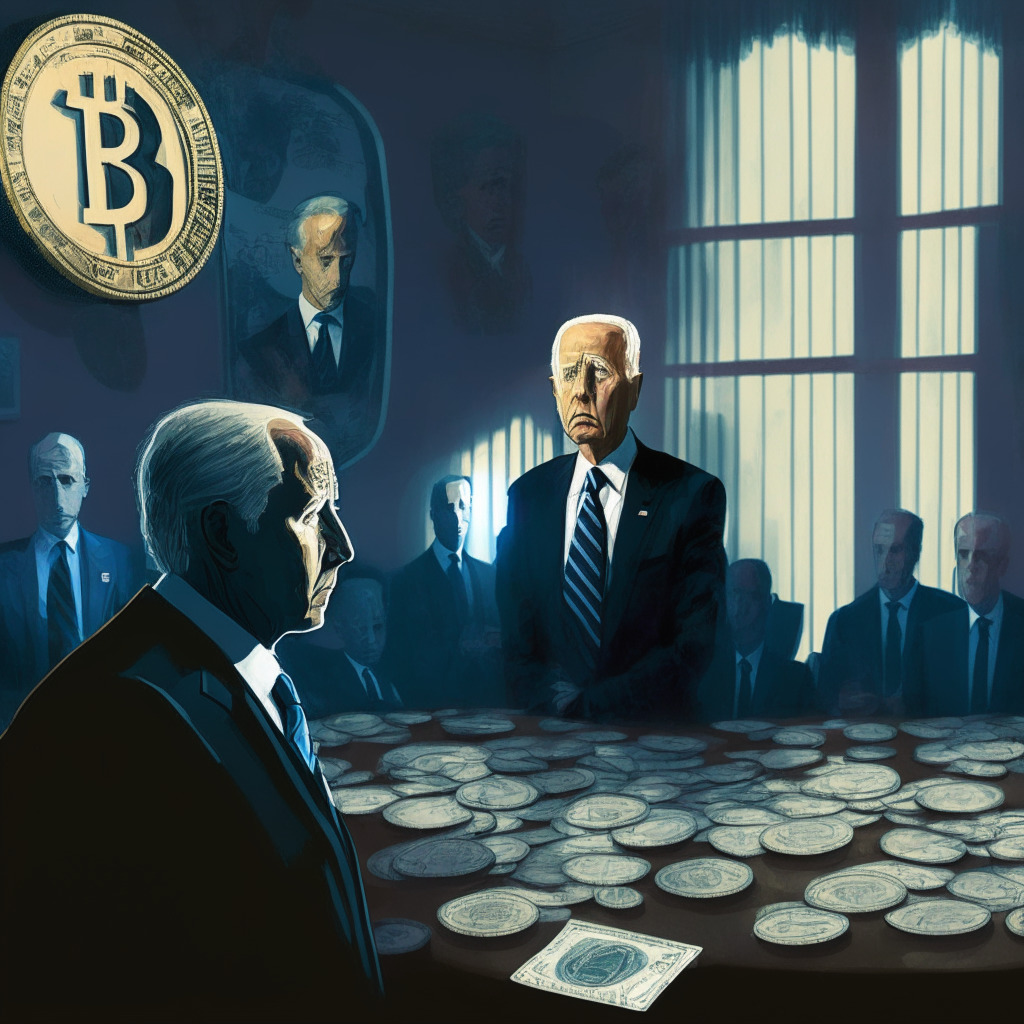At Consensus 2023, CoinDesk panelists reflected on the “ICO mania” period (2017-2018), highlighting both its opportunities and challenges. Initial Coin Offerings (ICOs) brought significant decentralized finance projects like Aave and 0x but also faced issues of investment fraud and securities violations, with 80% of ICOs found to be scams.
Search Results for: us treasury
MakerDAO Drops USDP: DeFi Stability Concerns & Avenues To Maximize Revenues
MakerDAO’s community vote unanimously decided to eliminate the $500 million USDP stablecoin from its reserves, impacting Paxos and raising concerns about the stability of some stablecoins within the crypto ecosystem. The decision aims to increase revenues and improve the protocol’s capital efficiency.
US Default Averted: Market Optimism Fuels Crypto Rally and Debate on Future Prospects
US futures surged on Thursday as the House of Representatives passed a crucial deal averting a dangerous US default. Combined with hints of a pause in interest-rate hikes, this sparked optimism in the market. Positive trends were observed in S&P 500, Dow Jones Industrial Average, and Nasdaq Composite futures, while tech-heavy Nasdaq experienced a slight setback. The broader cryptocurrency market may also be impacted by this development.
BIT Mining Shifts Focus from Ethereum to Dogecoin and Litecoin: A Wise Move?
BIT Mining, once reliant on Ethereum for self-mining revenue, has shifted focus to Dogecoin and Litecoin after Ethereum transitioned from proof of work to proof of stake. The miner reported $72.9 million in revenue for the last quarter but experienced a 75% drop YoY.
Crypto Market Volatility Looms as US Debt Ceiling Lifts and Liquidity Tightens
Crypto markets may face a downturn as liquidity tightening resumes after the U.S. debt ceiling is lifted, resulting in the replenishment of the U.S. Treasury General Account (TGA) and the Federal Reserve winding down its balance sheet. This scenario could pressure cryptocurrency prices in the coming months, affecting risk assets like cryptocurrencies and metaverse projects.
Cryptocurrency and Fentanyl Crisis: Senator Warren’s Regulatory Push Amid Alarming Stats
Sen. Elizabeth Warren calls out cryptocurrency’s role in fentanyl drug transactions, highlighting her Digital Asset Anti-Money Laundering Act. Cryptocurrency enabled 90 Chinese suppliers to exchange precursor drugs, producing $54 billion worth of fentanyl pills, causing concerns over crypto’s potential to facilitate illegal activities.
HKMA and CBUAE Collab on Virtual Assets: Boosting Fintech and Challenging US Hegemony
The Hong Kong Monetary Authority (HKMA) and the Central Bank of the United Arab Emirates (CBUAE) collaborate on virtual asset regulations and developments, aiming to strengthen cooperation, promote fintech initiatives, and improve cross-border trade settlement. This partnership coincides with Hong Kong’s Securities and Futures Commission allowing virtual asset service providers to cater to retail investors.
DeFi Exploit Negotiations: Effective Recovery or Dangerous Precedent? Debate Sparks
The Jimbos Protocol team offers a deal to the exploiter who drained $7.5 million from their DeFi app: return 90% of the funds and keep 10%, or face prosecution. This raises questions about the ethics of negotiating with hackers and highlights the importance of robust security measures in the blockchain industry.
Crypto Mining Tax Shelved: Balancing Innovation, Regulation, and Sustainability Debate
The proposed Digital Asset Mining Energy excise tax (DAME) on cryptocurrency mining is absent from the recent US debt ceiling deal, stirring debates. While proponents argue DAME could generate revenue and promote eco-friendly practices, critics warn against stifling the growing industry with taxes.
US Debt Ceiling Agreement Fuels Bitcoin’s Rally: Will the Bullish Trend Continue or Correct?
Bitcoin’s value sees an uptick amid US debt ceiling discussions, as a preliminary agreement is reached between President Joe Biden and Republican leader Kevin McCarthy. The debt ceiling agreement could impact the Federal Reserve’s money-printing activities, potentially benefiting Bitcoin due to its inverse trading relationship with the USD. However, a significant barrier at the $28,300 level may affect Bitcoin’s upward trajectory.
US Debt Ceiling Hike Ignites Crypto Surge: Pros, Cons, and the Future of Blockchain Markets
Bitcoin (BTC) surged 3.5% as the US plans to raise the debt ceiling, trading at $28,053 with a market cap of $542 billion. The resolution of the debt-ceiling deadlock positively impacted the risk sentiment. On-chain data shows BTC’s address activity rebounding to a three-week high, supporting sustained rallies.
Crypto Market Surges Amid US Debt Ceiling Negotiations: Relief or Overconfidence?
Cryptocurrency prices received a boost as the likelihood of a US debt default seemed less probable. Bitcoin climbed 2.9%, Ethereum was up 1.4%, while altcoins like Cardano and Solana saw even bigger gains. Uncertainty remains regarding the debt ceiling situation and its potential impact on markets; crypto enthusiasts should remain vigilant and informed.
Stablecoin Market Shifts: USDT Reigns Supreme as USDC Fumbles with Regulation
The market dominance of stablecoins has shifted, with Tether’s USDT hitting an all-time high and Circle’s USDC experiencing a downturn. Increased transparency is emphasized for stablecoin reserves, while Tether and Circle reduce banking exposure amid economic uncertainty and increase US Treasury holdings.
IMF’s US Rate Hike Advice: The Impact on Crypto Markets and Inflation Control
The IMF advises the US Federal Reserve to maintain interest rate hikes and adopt stringent fiscal policy to minimize federal debt. The tightening of fiscal policies and potential rate hikes might impact stock and crypto markets, causing a temporary decrease in Bitcoin value.
US Debt Default Threat: Implications for Bitcoin, Ethereum, and Global Crypto Market
The U.S. risks its first-ever debt default, potentially impacting global markets and cryptocurrencies, including Bitcoin and Ethereum. Cryptocurrency markets face uncertainty, and the larger question is whether lawmakers can find a permanent solution to ease financial market tensions.
US Debt Ceiling Crisis: Impact on Crypto Markets and Blockchain Technology
The US faces a potential catastrophic default as President Joe Biden and Republican Kevin McCarthy urgently negotiate the debt ceiling. House Speaker McCarthy expresses optimism, with significant progress made during Wednesday’s talks. However, unresolved issues persist, causing tension in financial markets, including the crypto market. A deal failure by June 1st could result in severe consequences.
Crypto Market Turmoil: US Debt Default Deadline, Recovery Hopes, and 2024 Watershed Moment
Cryptocurrencies like Bitcoin and Ethereum may experience massive selloffs due to the approaching US debt default deadline, predicts Blockchain.com CEO Peter Smith. However, cryptocurrencies are expected to bounce back soon after any initial impact. The ongoing debt ceiling talks have led to Bitcoin investors panicking and prices dipping, highlighting the need for market vigilance.
US Debt Ceiling Crisis: Impact on Bitcoin Options and Market Uncertainty
As the US faces a debt ceiling crisis, Bitcoin options market displays a six-month bias towards weakness, with the call-put skew at its lowest since March. Investors now show a preference for put options, aligning with recent trends in the S&P 500 market. The uncertainty surrounding debt ceiling negotiations impacts bond markets, and Bitcoin’s price fell by 10%, as the US dollar’s appeal as a safe haven grows.
Crypto Market Slides as US Debt Ceiling Crisis Looms: Analyzing the Impact and Future
The crypto market cap slid 2% last week, with Bitcoin briefly dropping below $26k amid investor panic over the US’s negative credit rating watch due to debt ceiling talks. Major altcoins such as Ethereum, XRP, Cardano, Polygon, and Solana also experienced fluctuations near key support levels.
Bearish Bitcoin Outlook: Analyzing Peter Brandt’s Prediction Amid US Debt Crisis
Renowned trader Peter Brandt recently shared a bearish outlook on Bitcoin, pointing to a chart pattern known as a pennant or flag. Bitcoin’s ongoing consolidation and uncertainties surrounding US debt ceiling talks contribute to the overall cautious sentiment.
US Debt Ceiling Dilemma: Impact on Crypto and Financial Markets, A Dual-Edged Sword
The U.S. debt ceiling deadline creates uncertainty in financial markets, affecting both traditional and cryptocurrency assets. As the U.S. Treasury risks a negative balance by Friday, negotiations on the $31.4 trillion debt ceiling raise will impact economic and blockchain future.
US Debt Ceiling Dilemma: Impact on Crypto and Stock Markets, Weighing Pros and Cons
The US debt ceiling situation may significantly impact stocks and cryptocurrency markets, with potential “catastrophic” global consequences. The outcome could lead investors to sell off stocks and cryptocurrencies and purchase high-yield Treasury bills. However, Bitcoin may rally in the coming weeks amid a weakening US dollar dominance.
Debt Ceiling Crisis Looms: US Economy on the Edge as Biden and McCarthy Struggle to Agree
As the June 1 deadline approaches, the impasse between President Biden and House Speaker McCarthy on raising the US government’s debt ceiling could lead to an unprecedented debt default, impacting the US economy and global markets. With the Treasury’s cash reserves dwindling, both parties need to find a resolution to avoid disastrous consequences.
US Debt Ceiling Stalemate: Implications for Bitcoin and Global Crypto Adoption
Bitcoin’s price hovers near $26,800 amidst uncertainty surrounding the US debt-ceiling stalemate, raising questions about the impact on cryptocurrencies if the government defaults. As centralized institutions face challenges, the role of cryptocurrencies as a hedge in developing nations gains attention, fueling discussions around their real-world utility and inherent value.
US Default Risk Looms: Stock Market and Crypto Impact, Market Turbulence Ahead?
The US debt ceiling deadlock poses a significant threat to financial markets worldwide; however, the stock and crypto markets remain relatively unaffected. JPMorgan warns of potential volatility surge as the default deadline approaches, which could impact the cryptocurrency market and influence Bitcoin’s support level.
US Bank Mergers: Solving the Crisis or Creating Riskier Financial Giants? Debating Pros and Cons
US Treasury Secretary Janet Yellen discussed the possibility of more bank mergers amid the ongoing banking crisis. However, concerns arise over the growing power of financial giants, potentially posing a threat to Americans and the economy. The delicate balance between ensuring stability and preventing “too big to fail” institutions remains a challenge.
Predicting Bitcoin’s Fate Amid US Debt Ceiling Crisis: Expert Insights and Market Dynamics
Legendary trader Peter Brandt predicts potential Bitcoin price downfall amid U.S. debt ceiling dilemma and market volatility. Despite being bullish on a $40,000 target, bearish sentiment increases. Brandt, known for accurate past analyses, warns against dismissing downside risks and overconfidence in price predictions.
White House Crypto Policies Amid Debt Ceiling Crisis: Balancing Regulation & Innovation
The White House is actively addressing cryptocurrency policy amid concerns over the debt ceiling and potential economic consequences. President Biden seeks a debt deal that doesn’t protect crypto traders and wealthy tax evaders, while the US Treasury warns of potential economic danger without an agreement. Striking a balance between regulation and innovation in crypto is crucial as investors and traders closely monitor upcoming economic events and policies.
Upcoming USD Events Impact on Bitcoin: Bullish Triumph or Stumble Ahead?
As BTC continues its upward journey, factors such as regulatory updates, institutional adoption, and market sentiment may shape its future. With upcoming USD events, investors should exercise caution during fluctuations. Key technical indicators suggest a neutral position; however, Bitcoin’s decisive close above or below specific levels will determine its next move.
Biden’s Stance on Crypto Taxes: Unmasking the Divide in the US Debt Crisis Debate
During the G7 talks, President Joe Biden declared the proposed budget terms as “unacceptable,” arguing that protecting tax-loss harvesting strategies for crypto traders risks food assistance for Americans. This controversy highlights the growing divide between the White House and Republican leaders, with ongoing negotiations surrounding US debt crisis and tax-related loopholes putting the country’s financial future in debate.
Navigating Crypto Markets Amid Bearish Trends & US Debt Standoff: Can Bulls Break Free?
A bearish market structure has reduced the cryptocurrency market capitalization to $1.13 trillion, with derivative metrics indicating a struggle for crypto bulls to break the downtrend. The U.S. debt ceiling standoff adds uncertainty, causing hesitancy among traders to bet on the market until more clarity is achieved. Derivatives metrics suggest bears remain in a comfortable position for now.
US Debt Ceiling Crisis: A Potential Bitcoin Surge or Temporary Crash?
The US debt ceiling crisis could potentially cause a surge in Bitcoin’s price, as investors search for alternatives amidst stock market destabilization. Traditional finance investors may view Bitcoin as a safe haven during these uncertain times, with predictions of significant price increases.































